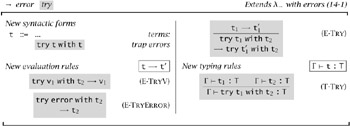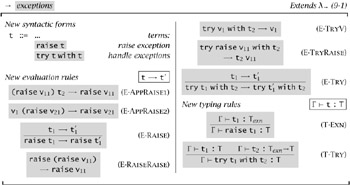Chapter 14: Exceptions
|
| < Free Open Study > |
|
Overview
In Chapter 13 we saw how to extend the simple operational semantics of the pure simply typed lambda-calculus with mutable references and considered the effect of this extension on the typing rules and type safety proofs. In this chapter, we treat another extension to our original computational model: raising and handling exceptions.
Real-world programming is full of situations where a function needs to signal to its caller that it is unable to perform its task for some reason—because some calculation would involve a division by zero or an arithmetic overflow, a lookup key is missing from a dictionary, an array index went out of bounds, a file could not be found or opened, some disastrous event occurred such as the system running out of memory or the user killing the process, etc.
Some of these exceptional conditions can be signaled by making the function return a variant (or option), as we saw in §11.10. But in situations where the exceptional conditions are truly exceptional, we may not want to force every caller of our function to deal with the possibility that they may occur. Instead, we may prefer that an exceptional condition causes a direct transfer of control to an exception handler defined at some higher-level in the program—or indeed (if the exceptional condition is rare enough or if there is nothing that the caller can do anyway to recover from it) simply aborts the program. We first consider the latter case (§14.1), where an exception is a whole-program abort, then add a mechanism for trapping and recovering from exceptions (§14.2), and finally refine both of these mechanisms to allow extra programmer-specified data to be passed between exception sites and handlers (§14.3). [1]

Figure 14-1: Errors

Figure 14-2: Error Handling

Figure 14-3: Exceptions Carrying Values
[1]The systems studied in this chapter are the simply typed lambda-calculus (Figure 9-1) extended with various primitives for exceptions and exception handling (Figures 14-1 and 14-2). The OCaml implementation of the first extension is fullerror. The language with exceptions carrying values (Figure 14-3) is not implemented.
|
| < Free Open Study > |
|
EAN: 2147483647
Pages: 262